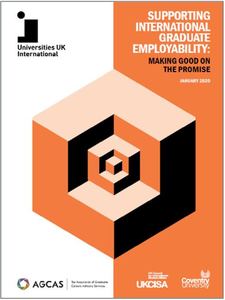International Strategy for Higher Education Institutions
International Strategy for Higher Education Institutions

Posted on by Vicky Lewis
 Sometimes conferences generate a lot of media (and social media) buzz. That was the case with the 28 January UUK International event on International Graduate Employability: Making Good on the Promise. Perhaps this was because it was the first of its kind to connect together some important agendas, which need to be thought about holistically rather than in isolation.
Sometimes conferences generate a lot of media (and social media) buzz. That was the case with the 28 January UUK International event on International Graduate Employability: Making Good on the Promise. Perhaps this was because it was the first of its kind to connect together some important agendas, which need to be thought about holistically rather than in isolation.
Of course, one of the first developments that comes to mind when one thinks about international graduate employability is the long-awaited new post-study work route, which will allow international graduates of UK HEIs to seek and undertake employment in the UK for two years after they graduate. While this is extremely welcome, it opens up some questions about whether UK universities are equipped to meet the expectations of their international students – not only the small minority who choose to remain in the UK, but also the 90 per cent who, on graduation, return home to pursue their careers.
This article highlights three themes that came through loud and clear at the conference, before suggesting some practical ways in which HEIs can adapt to support the employability of their international graduates.
For alliterative purposes, the three themes can be summarised as:
The point I’d like to draw out here is that international graduate outcomes are a powerful differentiator. This works at both national and institutional level.
Several speakers, including Jamie Arrowsmith from UUKi, urged the UK HE sector to respond proactively to Action 5 in the UK’s International Education Strategy, viz:
‘The UK Government will work with UUKi and sector to identify and share good practice in how universities effectively support international students into employment and further study, both here in the UK and when they return to their home nation. We will also work with the sector to enhance the evidence base on international graduate outcomes.’
Given overwhelming evidence (e.g. from i-graduate’s Student Barometer) that future career impact is the most important decision factor for international students selecting their future institution, it would be foolish not to work together as a sector to ensure that a UK higher education equips its international graduates for global career success better than any other.
Drilling down to institution level, Louise Nicol of Asia Careers Group observed that an HEI’s personality is reflected in its graduate outcomes. She went on to provide some clear portraits of different UK universities based on international outcomes data and individual graduate case studies. The personality of each university shone through strongly, providing an evidence-based foundation for the differentiation that every institution seeks.
Key aspects of both national and institutional character can be highlighted by focusing on international graduate outcomes.
Collaboration – both between and within HEIs – is a prerequisite for successfully supporting international graduate employability.
Working together as part of a consortium allows universities to provide the kind of country-specific careers support for their international students that would not be viable for most institutions to offer on their own.
For example, the University of Warwick has led on development of a UK China Careers Fair Roadshow for students of the universities of Manchester, Oxford, Birmingham, Nottingham, Leeds, Liverpool, Lancaster, Bath and Bristol seeking employment opportunities in China and Hong Kong.
However, the highest-impact collaboration that any institution can engage in is between its own internal teams. Too often, there is a lack of shared agenda between key internal stakeholders. To be effective, there needs to be close cooperation between the Careers and Employability team, the International Student Recruitment team, the Marketing and Communications team and the Alumni Relations team.
Zoe Marlow of Sannam S4 noted that these teams need to work hand-in-hand to position international employability as part of the university’s proposition.
This requires members of each team to understand the other teams’ agendas and what they bring to the table – and to cede a certain amount of control to colleagues in other departments.
This theme is linked to the theme of collaboration.
Providing careers and employability advice and support for international graduates is not cheap and the remit of careers services has, traditionally and for quite valid reasons, tended to focus primarily on domestic opportunities for domestic graduates.
So, where does the funding come from? If careers services are to take on a more inclusive approach, which addresses the expectations and support needs of all students and graduates (including those seeking work outside the UK), they will need to be better funded.
One fascinating insight shared by i-graduate at the conference is that average investment in UK university careers services has remained static for the last 5 years at around £65 per student FTE per annum. Over the same period, average investment in marketing has risen by 20% and now stands close to £600 per student per annum.
Careers services need to make common cause with internal allies who stand to benefit from their endeavours.
Careers teams may not have funding for international travel, but International Offices do – and can usually see the benefit of showcasing their institution’s careers advice as part of their student recruitment efforts.
Marketing teams always welcome case studies of graduates in interesting careers or roles to profile in publications and share on social media. Alumni teams are keen for graduates to benefit from ongoing employment advice so that they continue to feel connected to the university and more inclined to give back in some form.
Sharing out the costs (and some of the work) across different teams can help to dismantle silos, build shared institutional priorities, and keep expenditure down.
One of the things that struck me at the conference was the fact that different UK HEIs are at such different stages when it comes to engaging with international graduate employability – and have such different resource bases.
At one end of the spectrum, Imperial College Business School has brought on board a Mandarin-speaking careers consultant and appointed a Head of Employer Relations, based in the APAC region. Glasgow’s Adam Smith Business School offers in-country professional development workshops in Shanghai and Beijing for recently returned graduates and alumni.
At the other end of the spectrum, institutions with very modest careers teams, mainly comprising part-time advisors, are scratching their heads (and their meagre coffers) wondering how they can possibly meet international student expectations.
For those who are starting from a low base, here are a few practical tips.
Further ideas and case studies are contained in the new report, Supporting international graduate employability: making good on the promise, launched at the UUKi event.
Many UK universities have significant numbers of international students, most of whom are drawn to overseas study by the prospect of its career enhancing properties. Offering employability advice and support that covers opportunities in other countries may seem a little daunting, but is also plain common sense (as well as being relevant to UK graduates with international ambitions).
Globally successful graduates, who feel that their university experience helped them along in their career, will often be powerful ambassadors for and loyal supporters of their alma mater. Their success therefore fuels effective international marketing and student recruitment and enhances alumni engagement.
Universities that have managed to create strategies that join up these activity strands and facilitate collaborative working across key functions will be much better positioned for the future than those which keep doing what they’ve always done.
If you’re interested in discussing how to set that joining up process in motion, do get in touch with Vicky Lewis Consulting.
INTERNATIONAL GRADUATE EMPLOYABILITY CAREERS INTERNATIONAL STUDENT RECRUITMENT UUK INTERNATIONAL OUTCOMES DATA ALUMNI RELATIONS INTERNATIONAL MARKETING
|
|